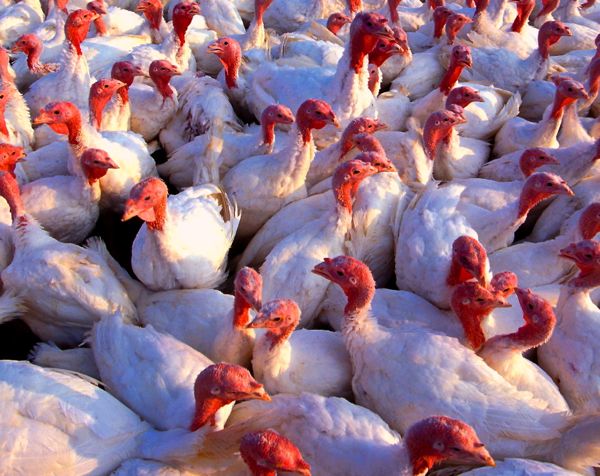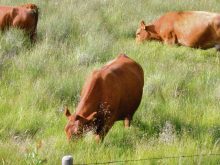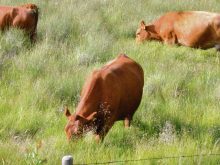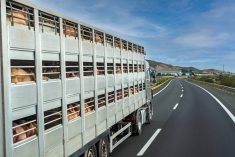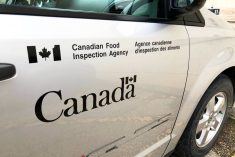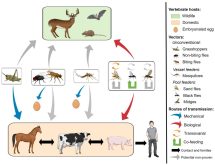The only farm in Canada now in the midst of an avian flu cleanup is the centre of a new control zone, meant to limit the flu’s spread and keep Canada’s trading partners at ease.
The Canadian Food Inspection Agency (CFIA) on Sunday announced it has set up an avian flu control zone, which so far includes all properties in a 10-kilometre radius around the affected turkey farm west of Woodstock, Ont.
Turkeys on the Oxford County farm were confirmed last Wednesday to have highly pathogenic (“high-path”) H5N2 avian flu. The farm, which had almost 45,000 turkeys, was completely “depopulated” of birds effective Friday, the agency said.
Read Also

U.S. grains: Wheat falls after hitting six-week high on U.S., Russia crop worries
Chicago | Reuters – Chicago Board of Trade wheat futures pulled back after climbing to a six-week high on Monday…
As of Sunday, the CFIA has quarantined and is “closely” monitoring 29 premises considered to be at risk for avian flu stemming from their assorted contacts with the Woodstock-area farm. The agency emphasized only the one infected farm has so far shown any sign of illness in its birds.
The control zone — which restricts outbound movement of captive birds, eggs and/or poultry products, as well as feed, equipment and/or work clothes exposed to captive birds– is part of an “internationally accepted practice” that’s meant to allow trade to continue from a country’s “non-infected” regions and limit any market access restrictions on those regions, the agency said.
U.S. trade, U.S. cases
The U.S., for one, recognized the 10-km radius zone as of Saturday, CFIA said. The U.S. government had moved two days earlier to temporarily ban imports of birds, hatching eggs, raw poultry meat, raw eggs and egg products, raw animal products and byproducts from all of Ontario.
Trade with the U.S. outside the Woodstock-area control zone resumes as of Monday (April 13), CFIA said Sunday.
Canada’s National Centre for Foreign Animal Disease (NCFAD) in Winnipeg has also completed tests to sequence the virus of the H5N2 strain in the Ontario case, CFIA said Sunday.
The strain in this case is “nearly identical” to the strain identified on 12 farms in British Columbia’s Fraser Valley in December, the agency said. Those farms have all since been depopulated, cleaned and disinfected and their federal quarantines have been lifted.
H5N2 has also been confirmed in commercial and backyard poultry in 11 states; North Dakota and Wisconsin both joined the list as of Saturday. North Dakota’s case was at a commercial turkey farm in Dickey County, in the state’s southeast.
Wisconsin’s new case — found in Jefferson County, between Madison and Milwaukee — marks the first U.S. case of high-path H5N2 at a commercial-scale chicken farm. Previous cases in chickens in other states were at “backyard”-sized operations.
CFIA as of Monday hadn’t yet announced restrictions on cross-border imports of live birds, eggs, raw poultry products and raw pet foods from North Dakota or Wisconsin. Given the bans imposed on such imports from other states with confirmed avian flu cases, those bans are likely to be announced soon.
Show won’t go on
The H5N2 outbreak at the Woodstock turkey farm has also led organizers of the London Poultry Show to cancel the major annual event, which until now was scheduled for April 22-23.
Ontario’s Poultry Industry Council and the event’s host, the Western Fair District, announced the cancellation Friday, based on a recommendation from the province’s Feather Board Command Centre (FBCC), the emergency response office for Ontario’s poultry and egg boards.
London’s Western Fair District is outside the new control zone, but organizers said Friday the show could present a “potential vector” for the spread of avian flu.
The show, they said, would otherwise be an “important educational opportunity,” but the risk to the industry “outweighs any potential benefits” as well as any consequences from cancelling it. — AGCanada.com Network

